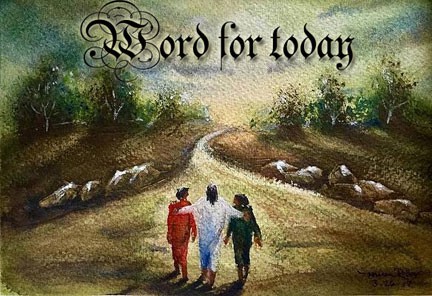Watch
Events
Articles
Market
More
090325 / 9th day of the 6th month 5786
WORD FOR TODAY “will your name be in there?”: Dan 7:10 "A river of fire was flowing And coming out from before Him; Thousands upon thousands were attending Him, And myriads upon myriads were standing before Him; The court sat, And the books were opened.
WISDOM FOR TODAY: Pro 23:27 For a harlot is a deep pit And an adulterous woman is a narrow well. Pro 23:28 Surely she lurks as a robber, And increases the faithless among men.
www.BGMCTV.org




Matthew 7:1, ““Do not judge, or you will be judged.” Often quoted correctly but rarely used in it’s proper context. The following verse reminds us to be very careful how we look at others. Later we read in Matthew 7:15 about false prophets. accusing someone of being a false prophets is judging them. Paul writes in 1 Corinthians 6:2 — 3, “Do you not know that the saints will judge the world? And if you are to judge the world, are you not competent to judge trivial cases? Do you not know that we will judge angels? How much more the things of this life!” This doesn’t contradict Matt.7:1, it reminds us how we should see others for who they really are and not who we think they are.



Thought for Today: Wednesday September 03
John Knox spent much time in prayer, and the church in Scotland burst into new life. John Wesley prayed long and often, and the Methodist movement was born. Martin Luther prayed earnestly, and the Reformation exploded across Europe. SO, why was prayer so important to these men? Because they knew they were up against almost overwhelming forces of spiritual opposition… YHVH desires that we believers be concerned and burdened for a lost world. If we pray this kind of prayer, an era of peace may come to the world and wickedness may be turned back. “The effective, fervent prayer of a righteous man avail much” (James 5:16)



Stacked, not swapped.
Synergistic, not antagonistic.
https://rumble.com/v6ybdog-cov....enants-are-synergist



The law about divorce and remarriage in Deuteronomy 24:1-4 is not a prophetic pattern of God and Israel. On the surface, it sounds like it could be, but when you examine the details, this idea falls completely apart.
https://americantorah.com/2025..../08/05/the-doctrine-



Israel began as a nation of shepherds. As Samuel and Keila Wearp explain, Abraham was a shepherd, as were David and Deborah. It shouldn’t be a surprise that shepherds are still important in Israel today as the Jewish people reclaim the land God gave them. What may be surprising is who these shepherds are, and the importance of their work for the future of Israel. That’s an important part of this second part of our conversation about the Wearps’ Sheep Shearing expedition with their ministry, Rising Sparks.
The restoration of Israel is a work in progress, which means the final redemption of Israel and the whole world is still a work in progress. Barry Phillips and David Jones have a few thoughts about how God is proceeding with that work, and the way He invites us all to participate. That’s the topic not only of their midrash, “Stones, Children, and Builders,” but also of the music shared by Samuel and Benjamin Wearp and the Exodus Road Band.
https://www.buzzsprout.com/229....2194/episodes/177176



Israel began as a nation of shepherds. As Samuel and Keila Wearp explain, Abraham was a shepherd, as were David and Deborah. It shouldn’t be a surprise that shepherds are still important in Israel today as the Jewish people reclaim the land God gave them. What may be surprising is who these shepherds are, and the importance of their work for the future of Israel. That’s an important part of this second part of our conversation about the Wearps’ Sheep Shearing expedition with their ministry, Rising Sparks.
The restoration of Israel is a work in progress, which means the final redemption of Israel and the whole world is still a work in progress. Barry Phillips and David Jones have a few thoughts about how God is proceeding with that work, and the way He invites us all to participate. That’s the topic not only of their midrash, “Stones, Children, and Builders,” but also of the music shared by Samuel and Benjamin Wearp and the Exodus Road Band.
https://www.buzzsprout.com/229....2194/episodes/177176


